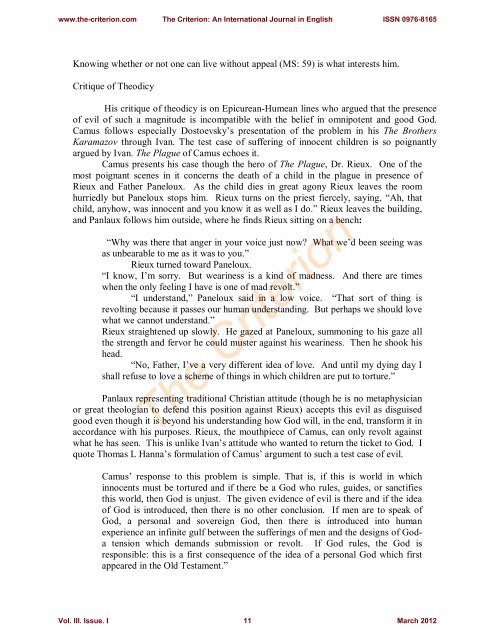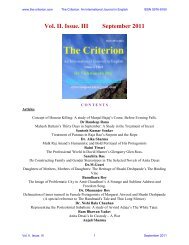Albert Camus: The Rebel Absurdist - The Criterion: An International ...
Albert Camus: The Rebel Absurdist - The Criterion: An International ...
Albert Camus: The Rebel Absurdist - The Criterion: An International ...
You also want an ePaper? Increase the reach of your titles
YUMPU automatically turns print PDFs into web optimized ePapers that Google loves.
www.the-criterion.com <strong>The</strong> <strong>Criterion</strong>: <strong>An</strong> <strong>International</strong> Journal in English ISSN 0976-8165<br />
Knowing whether or not one can live without appeal (MS: 59) is what interests him.<br />
Critique of <strong>The</strong>odicy<br />
His critique of theodicy is on Epicurean-Humean lines who argued that the presence<br />
of evil of such a magnitude is incompatible with the belief in omnipotent and good God.<br />
<strong>Camus</strong> follows especially Dostoevsky’s presentation of the problem in his <strong>The</strong> Brothers<br />
Karamazov through Ivan. <strong>The</strong> test case of suffering of innocent children is so poignantly<br />
argued by Ivan. <strong>The</strong> Plague of <strong>Camus</strong> echoes it.<br />
<strong>Camus</strong> presents his case though the hero of <strong>The</strong> Plague, Dr. Rieux. One of the<br />
most poignant scenes in it concerns the death of a child in the plague in presence of<br />
Rieux and Father Paneloux. As the child dies in great agony Rieux leaves the room<br />
hurriedly but Paneloux stops him. Rieux turns on the priest fiercely, saying, “Ah, that<br />
child, anyhow, was innocent and you know it as well as I do.” Rieux leaves the building,<br />
and Panlaux follows him outside, where he finds Rieux sitting on a bench:<br />
“Why was there that anger in your voice just now? What we’d been seeing was<br />
as unbearable to me as it was to you.”<br />
Rieux turned toward Paneloux.<br />
“I know, I’m sorry. But weariness is a kind of madness. <strong>An</strong>d there are times<br />
when the only feeling I have is one of mad revolt.”<br />
“I understand,” Paneloux said in a low voice. “That sort of thing is<br />
revolting because it passes our human understanding. But perhaps we should love<br />
what we cannot understand.”<br />
Rieux straightened up slowly. He gazed at Paneloux, summoning to his gaze all<br />
the strength and fervor he could muster against his weariness. <strong>The</strong>n he shook his<br />
head.<br />
“No, Father, I’ve a very different idea of love. <strong>An</strong>d until my dying day I<br />
shall refuse to love a scheme of things in which children are put to torture.”<br />
Panlaux representing traditional Christian attitude (though he is no metaphysician<br />
or great theologian to defend this position against Rieux) accepts this evil as disguised<br />
good even though it is beyond his understanding how God will, in the end, transform it in<br />
<strong>The</strong> <strong>Criterion</strong><br />
accordance with his purposes. Rieux, the mouthpiece of <strong>Camus</strong>, can only revolt against<br />
what he has seen. This is unlike Ivan’s attitude who wanted to return the ticket to God. I<br />
quote Thomas L Hanna’s formulation of <strong>Camus</strong>’ argument to such a test case of evil.<br />
<strong>Camus</strong>’ response to this problem is simple. That is, if this is world in which<br />
innocents must be tortured and if there be a God who rules, guides, or sanctifies<br />
this world, then God is unjust. <strong>The</strong> given evidence of evil is there and if the idea<br />
of God is introduced, then there is no other conclusion. If men are to speak of<br />
God, a personal and sovereign God, then there is introduced into human<br />
experience an infinite gulf between the sufferings of men and the designs of Goda<br />
tension which demands submission or revolt. If God rules, the God is<br />
responsible: this is a first consequence of the idea of a personal God which first<br />
appeared in the Old Testament.”<br />
Vol. III. Issue. I 11 March 2012
















